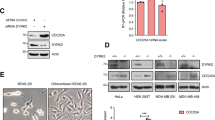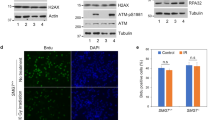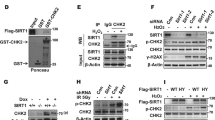Abstract
Upon different types of stress, the gene encoding the mitosis-promoting phosphatase Cdc25C is transcriptionally repressed by p53, contributing to p53’s enforcement of a G2 cell cycle arrest. In addition, Cdc25C protein stability is also decreased following DNA damage. Mdm2, another p53 target gene, encodes a ubiquitin ligase that negatively regulates p53 levels by ubiquitination. Ablation of Mdm2 by siRNA led to an increase in p53 protein and repression of Cdc25C gene expression. However, Cdc25C protein levels were actually increased following Mdm2 depletion. Mdm2 is shown to negatively regulate Cdc25C protein levels by reducing its half-life independently of the presence of p53. Further, Mdm2 physically interacts with Cdc25C and promotes its degradation through the proteasome in a ubiquitin-independent manner. Either Mdm2 overexpression or Cdc25C downregulation delays cell cycle progression through the G2/M phase. Thus, the repression of the Cdc25C promoter by p53, together with p53-dependent induction of Mdm2 and subsequent degradation of Cdc25C, could provide a dual mechanism by which p53 can enforce and maintain a G2/M cell cycle arrest.
This is a preview of subscription content, access via your institution
Access options
Subscribe to this journal
Receive 50 print issues and online access
$259.00 per year
only $5.18 per issue
Buy this article
- Purchase on Springer Link
- Instant access to full article PDF
Prices may be subject to local taxes which are calculated during checkout






Similar content being viewed by others
References
Vousden KH, Lu X . Live or let die: the cell's response to p53. Nat Rev Cancer 2002; 2: 594–604.
Donehower LA, Harvey M, Slagle BL, McArthur MJ, Montgomery Jr CA, Butel JS et al. Mice deficient for p53 are developmentally normal but susceptible to spontaneous tumours. Nature 1992; 356: 215–221.
Vogelstein B, Lane D, Levine AJ . Surfing the p53 network. Nature 2000; 408: 307–310.
Kubbutat MH, Jones SN, Vousden KH . Regulation of p53 stability by Mdm2. Nature 1997; 387: 299–303.
Oliner JD, Pietenpol JA, Thiagalingam S, Gyuris J, Kinzler KW, Vogelstein B . Oncoprotein MDM2 conceals the activation domain of tumour suppressor p53. Nature 1993; 362: 857–860.
Shvarts A, Steegenga WT, Riteco N, van Laar T, Dekker P, Bazuine M et al. MDMX: a novel p53-binding protein with some functional properties of MDM2. Embo J 1996; 15: 5349–5357.
Jones SN, Roe AE, Donehower LA, Bradley A . Rescue of embryonic lethality in Mdm2-deficient mice by absence of p53. Nature 1995; 378: 206–208.
Migliorini D, Denchi EL, Danovi D, Jochemsen A, Capillo M, Gobbi A et al. Mdm4 (Mdmx) regulates p53-induced growth arrest and neuronal cell death during early embryonic mouse development. Mol Cell Biol 2002; 22: 5527–5538.
Montes de Oca Luna R, Wagner DS, Lozano G . Rescue of early embryonic lethality in mdm2-deficient mice by deletion of p53. Nature 1995; 378: 203–206.
Oliner JD, Kinzler KW, Meltzer PS, George DL, Vogelstein B . Amplification of a gene encoding a p53-associated protein in human sarcomas. Nature 1992; 358: 80–83.
Manfredi JJ . The Mdm2-p53 relationship evolves: Mdm2 swings both ways as an oncogene and a tumor suppressor. Genes Dev 2010; 24: 1580–1589.
Brown DR, Thomas CA, Deb SP . The human oncoprotein MDM2 arrests the cell cycle: elimination of its cell-cycle-inhibitory function induces tumorigenesis. Embo J 1998; 17: 2513–2525.
Dang J, Kuo ML, Eischen CM, Stepanova L, Sherr CJ, Roussel MF . The RING domain of Mdm2 can inhibit cell proliferation. Cancer Res 2002; 62: 1222–1230.
Folberg-Blum A, Sapir A, Shilo BZ, Oren M . Overexpression of mouse Mdm2 induces developmental phenotypes in Drosophila. Oncogene 2002; 21: 2413–2417.
Lundgren K, Montes de Oca Luna R, McNeill YB, Emerick EP, Spencer B, Barfield CR et al. Targeted expression of MDM2 uncouples S phase from mitosis and inhibits mammary gland development independent of p53. Genes Dev 1997; 11: 714–725.
Ohkubo S, Tanaka T, Taya Y, Kitazato K, Prives C . Excess HDM2 impacts cell cycle and apoptosis and has a selective effect on p53 dependent transcription. J Biol Chem 2006; 281: 16943–16950.
Zhou R, Frum R, Deb S, Deb SP . The growth arrest function of the human oncoprotein mouse double minute-2 is disabled by downstream mutation in cancer cells. Cancer Res 2005; 65: 1839–1848.
Piwnica-Worms H . Cell cycle. Fools rush in. Nature 1999; 401: 537.
Imbriano C, Gurtner A, Cocchiarella F, Di Agostino S, Basile V, Gostissa M et al. Direct p53 Transcriptional Repression: In Vivo Analysis of CCAAT-Containing G2/M Promoters. Mol Cell Biol 2005; 25: 3737–3751.
Le Gac G, Esteve PO, Ferec C, Pradhan S . DNA damage-induced down-regulation of human Cdc25C and Cdc2 is mediated by cooperation between p53 and maintenance DNA (cytosine-5) methyltransferase 1. J Biol Chem 2006; 281: 24161–24170.
Lohr K, Moritz C, Contente A, Dobbelstein M . p21/CDKN1A Mediates Negative Regulation of Transcription by p53. J Biol Chem 2003; 278: 32507–32516.
Manni I, Mazzaro G, Gurtner A, Mantovani R, Haugwitz U, Krause K et al. NF-Y mediates the transcriptional inhibition of the cyclin B1, cyclin B2, and cdc25C promoters upon induced G2 arrest. J Biol Chem 2001; 276: 5570–5576.
St Clair S, Giono L, Varmeh-Ziaie S, Resnick-Silverman L, Liu WJ, Padi A et al. DNA damage-induced downregulation of Cdc25C is mediated by p53 via two independent mechanisms: one involves direct binding to the cdc25C promoter. Mol Cell 2004; 16: 725–736.
Badie C, Itzhaki JE, Sullivan MJ, Carpenter AJ, Porter AC . Repression of CDK1 and other genes with CDE and CHR promoter elements during DNA damage-induced G(2)/M arrest in human cells. Mol Cell Biol 2000; 20: 2358–2366.
St Clair S, Manfredi JJ . The dual specificity phosphatase Cdc25C is a direct target for transcriptional repression by the tumor suppressor p53. Cell Cycle 2006; 5: 709–713.
Vassilev LT, Vu BT, Graves B, Carvajal D, Podlaski F, Filipovic Z et al. In vivo activation of the p53 pathway by small-molecule antagonists of MDM2. Science 2004; 303: 844–848.
Giono LE, Manfredi JJ . Mdm2 is required for inhibition of Cdk2 activity by p21, thereby contributing to p53-dependent cell cycle arrest. Mol Cell Biol 2007; 27: 4166–4178.
Pines J, Hunter T . Isolation of a human cyclin cDNA: evidence for cyclin mRNA and protein regulation in the cell cycle and for interaction with p34cdc2. Cell 1989; 58: 833–846.
Innocente SA, Abrahamson JL, Cogswell JP, Lee JM . p53 regulates a G2 checkpoint through cyclin B1. Proc Natl Acad Sci USA 1999; 96: 2147–2152.
Jin Y, Lee H, Zeng SX, Dai MS, Lu H . MDM2 promotes p21waf1/cip1 proteasomal turnover independently of ubiquitylation. Embo J 2003; 22: 6365–6377.
Singh SV, Herman-Antosiewicz A, Singh AV, Lew KL, Srivastava SK, Kamath R et al. Sulforaphane-induced G2/M phase cell cycle arrest involves checkpoint kinase 2-mediated phosphorylation of cell division cycle 25C. J Biol Chem 2004; 279: 25813–25822.
Xu H, Zhang Z, Li M, Zhang R . MDM2 promotes proteasomal degradation of p21Waf1 via a conformation change. J Biol Chem 2010; 285: 18407–18414.
Chin L, Pomerantz J, DePinho RA . The INK4a/ARF tumor suppressor: one gene–two products—two pathways. Trends Biochem Sci 1998; 23: 291–296.
Zhang Y, Xiong Y, Yarbrough WG . ARF promotes MDM2 degradation and stabilizes p53: ARF-INK4a locus deletion impairs both the Rb and p53 tumor suppression pathways. Cell 1998; 92: 725–734.
Fang S, Jensen JP, Ludwig RL, Vousden KH, Weissman AM . Mdm2 is a RING finger-dependent ubiquitin protein ligase for itself and p53. J Biol Chem 2000; 275: 8945–8951.
Honda R, Tanaka H, Yasuda H . Oncoprotein MDM2 is a ubiquitin ligase E3 for tumor suppressor p53. FEBS Lett 1997; 420: 25–27.
Peng CY, Graves PR, Thoma RS, Wu Z, Shaw AS, Piwnica-Worms H . Mitotic and G2 checkpoint control: regulation of 14-3-3 protein binding by phosphorylation of Cdc25C on serine-216. Science 1997; 277: 1501–1505.
Graves PR, Lovly CM, Uy GL, Piwnica-Worms H . Localization of human Cdc25C is regulated both by nuclear export and 14-3-3 protein binding. Oncogene 2001; 20: 1839–1851.
Turowski P, Franckhauser C, Morris MC, Vaglio P, Fernandez A, Lamb NJ . Functional cdc25C dual-specificity phosphatase is required for S-phase entry in human cells. Mol Biol Cell 2003; 14: 2984–2998.
Chen F, Zhang Z, Bower J, Lu Y, Leonard SS, Ding M et al. Arsenite-induced Cdc25C degradation is through the KEN-box and ubiquitin-proteasome pathway. Proc Natl Acad Sci USA 2002; 99: 1990–1995.
Xiao D, Johnson CS, Trump DL, Singh SV . Proteasome-mediated degradation of cell division cycle 25C and cyclin-dependent kinase 1 in phenethyl isothiocyanate-induced G2-M-phase cell cycle arrest in PC-3 human prostate cancer cells. Mol Cancer Ther 2004; 3: 567–575.
Vecchione A, Baldassarre G, Ishii H, Nicoloso MS, Belletti B, Petrocca F et al. Fez1/Lzts1 absence impairs Cdk1/Cdc25C interaction during mitosis and predisposes mice to cancer development. Cancer Cell 2007; 11: 275–289.
Sdek P, Ying H, Chang DL, Qiu W, Zheng H, Touitou R et al. MDM2 promotes proteasome-dependent ubiquitin-independent degradation of retinoblastoma protein. Mol Cell 2005; 20: 699–708.
Chowdary DR, Dermody JJ, Jha KK, Ozer HL . Accumulation of p53 in a mutant cell line defective in the ubiquitin pathway. Mol Cell Biol 1994; 14: 1997–2003.
Asher G, Lotem J, Sachs L, Kahana C, Shaul Y . Mdm-2 and ubiquitin-independent p53 proteasomal degradation regulated by NQO1. Proc Natl Acad Sci USA 2002; 99: 13125–13130.
Bendjennat M, Boulaire J, Jascur T, Brickner H, Barbier V, Sarasin A et al. UV irradiation triggers ubiquitin-dependent degradation of p21(WAF1) to promote DNA repair. Cell 2003; 114: 599–610.
Chen X, Chi Y, Bloecher A, Aebersold R, Clurman BE, Roberts JM . N-acetylation and ubiquitin-independent proteasomal degradation of p21(Cip1). Mol Cell 2004; 16: 839–847.
Kong X, Lin Z, Liang D, Fath D, Sang N, Caro J . Histone deacetylase inhibitors induce VHL and ubiquitin-independent proteasomal degradation of hypoxia-inducible factor 1alpha. Mol Cell Biol 2006; 26: 2019–2028.
Kawai H, Wiederschain D, Kitao H, Stuart J, Tsai KK, Yuan ZM . DNA damage-induced MDMX degradation is mediated by MDM2. J Biol Chem 2003; 278: 45946–45953.
Donzelli M, Draetta GF . Regulating mammalian checkpoints through Cdc25 inactivation. EMBO Rep 2003; 4: 671–677.
Mailand N, Falck J, Lukas C, Syljuasen RG, Welcker M, Bartek J et al. Rapid destruction of human Cdc25A in response to DNA damage. Science 2000; 288: 1425–1429.
Wang X, McGowan CH, Zhao M, He L, Downey JS, Fearns C et al. Involvement of the MKK6-p38gamma cascade in gamma-radiation-induced cell cycle arrest. Mol Cell Biol 2000; 20: 4543–4552.
Graves PR, Yu L, Schwarz JK, Gales J, Sausville EA, O'Connor PM et al. The Chk1 protein kinase and the Cdc25C regulatory pathways are targets of the anticancer agent UCN-01. J Biol Chem 2000; 275: 5600–5605.
Liu TT, Liu YJ, Wang Q, Yang XG, Wang K . Reactive-oxygen-species-mediated Cdc25C degradation results in differential antiproliferative activities of vanadate, tungstate, and molybdate in the PC-3 human prostate cancer cell line. J Biol Inorg Chem 2012; 17: 311–320.
Raj K, Ogston P, Beard P . Virus-mediated killing of cells that lack p53 activity. Nature 2001; 412: 914–917.
Eymin B, Claverie P, Salon C, Brambilla C, Brambilla E, Gazzeri S . p14ARF triggers G2 arrest through ERK-mediated Cdc25C phosphorylation, ubiquitination and proteasomal degradation. Cell Cycle 2006; 5: 759–765.
Thanasoula M, Escandell JM, Suwaki N, Tarsounas M . ATM/ATR checkpoint activation downregulates CDC25C to prevent mitotic entry with uncapped telomeres. Embo J 2012; 31: 3398–3410.
Shabbeer S, Omer D, Berneman D, Weitzman O, Alpaugh A, Pietraszkiewicz A et al. BRCA1 targets G2/M cell cycle proteins for ubiquitination and proteasomal degradation. Oncogene 2013; 32: 5005–5016.
Yan Y, Spieker RS, Kim M, Stoeger SM, Cowan KH . BRCA1-mediated G2/M cell cycle arrest requires ERK1/2 kinase activation. Oncogene 2005; 24: 3285–3296.
Burri N, Shaw P, Bouzourene H, Sordat I, Sordat B, Gillet M et al. Methylation silencing and mutations of the p14ARF and p16INK4a genes in colon cancer. Lab Invest 2001; 81: 217–229.
Stott FJ, Bates S, James MC, McConnell BB, Starborg M, Brookes S et al. The alternative product from the human CDKN2A locus, p14(ARF), participates in a regulatory feedback loop with p53 and MDM2. Embo J 1998; 17: 5001–5014.
Boyd MT, Vlatkovic N, Haines DS . A novel cellular protein (MTBP) binds to MDM2 and induces a G1 arrest that is suppressed by MDM2. J Biol Chem 2000; 275: 31883–31890.
Ciznadija D, Zhu XH, Koff A . Hdm2- and proteasome-dependent turnover limits p21 accumulation during S phase. Cell Cycle 2011; 10: 2714–2723.
Loughran O, La Thangue NB . Apoptotic and growth-promoting activity of E2F modulated by MDM2. Mol Cell Biol 2000; 20: 2186–2197.
Uchida C, Miwa S, Kitagawa K, Hattori T, Isobe T, Otani S et al. Enhanced Mdm2 activity inhibits pRB function via ubiquitin-dependent degradation. Embo J 2005; 24: 160–169.
Wang B, Liu K, Lin HY, Bellam N, Ling S, Lin WC . 14-3-3Tau regulates ubiquitin-independent proteasomal degradation of p21, a novel mechanism of p21 downregulation in breast cancer. Mol Cell Biol 2010; 30: 1508–1527.
Zhang Z, Wang H, Li M, Agrawal S, Chen X, Zhang R . MDM2 is a negative regulator of p21WAF1/CIP1, independent of p53. J Biol Chem 2004; 279: 16000–16006.
Evans SC, Viswanathan M, Grier JD, Narayana M, El-Naggar AK, Lozano G . An alternatively spliced HDM2 product increases p53 activity by inhibiting HDM2. Oncogene 2001; 20: 4041–4049.
Perry ME, Mendrysa SM, Saucedo LJ, Tannous P, Holubar M . p76(MDM2) inhibits the ability of p90(MDM2) to destabilize p53. J Biol Chem 2000; 275: 5733–5738.
Calabro V, Mansueto G, Parisi T, Vivo M, Calogero RA, La Mantia G . The human MDM2 oncoprotein increases the transcriptional activity and the protein level of the p53 homolog p63. J Biol Chem 2002; 277: 2674–2681.
Kadakia M, Slader C, Berberich SJ . Regulation of p63 function by Mdm2 and MdmX. DNA Cell Biol 2001; 20: 321–330.
Little NA, Jochemsen AG . Hdmx and Mdm2 can repress transcription activation by p53 but not by p63. Oncogene 2001; 20: 4576–4580.
Ongkeko WM, Wang XQ, Siu WY, Lau AW, Yamashita K, Harris AL et al. MDM2 and MDMX bind and stabilize the p53-related protein p73. Curr Biol 1999; 9: 829–832.
Girnita L, Girnita A, Larsson O . Mdm2-dependent ubiquitination and degradation of the insulin-like growth factor 1 receptor. Proc Natl Acad Sci USA 2003; 100: 8247–8252.
Pan Y, Chen J . MDM2 promotes ubiquitination and degradation of MDMX. Mol Cell Biol 2003; 23: 5113–5121.
Coutts AS, Boulahbel H, Graham A, La Thangue NB . Mdm2 targets the p53 transcription cofactor JMY for degradation. EMBO Rep 2007; 8: 84–90.
Rinaldo C, Prodosmo A, Mancini F, Iacovelli S, Sacchi A, Moretti F et al. MDM2-regulated degradation of HIPK2 prevents p53Ser46 phosphorylation and DNA damage-induced apoptosis. Mol Cell 2007; 25: 739–750.
Shmueli A, Oren M . Mdm2: p53's Lifesaver? Mol Cell 2007; 25: 794–796.
Sudo T, Ota Y, Kotani S, Nakao M, Takami Y, Takeda S et al. Activation of Cdh1-dependent APC is required for G1 cell cycle arrest and DNA damage-induced G2 checkpoint in vertebrate cells. Embo J 2001; 20: 6499–6508.
Obeyesekere MN, Tecarro E, Lozano G . Model predictions of MDM2 mediated cell regulation. Cell Cycle 2004; 3: 655–661.
Garcia P, Cales C . Endoreplication in megakaryoblastic cell lines is accompanied by sustained expression of G1/S cyclins and downregulation of cdc25C. Oncogene 1996; 13: 695–703.
Varmeh-Ziaie S, Manfredi JJ . The dual-specificity phosphatase Cdc25B, but not the closely related Cdc25C, is capable of inhibiting cellular proliferation in a manner dependent upon its catalytic activity. J Biol Chem 2007; 282: 24633–24641.
Acknowledgements
We are grateful to Matthew O’Connell and Zhen-Qiang Pan for their technical advice, helpful discussions and sharing reagents. Present and past members of the Manfredi laboratory: Dana Lukin, Anthony Mastropietro, Wendy Liu, Sejal Patel, Shohreh Varmeh-Ziaie, Pierre-Jacques Hamard and Kester Haye are thanked for their help and support. Quantitative PCR was performed at the Mount Sinai shared research facility. These studies were supported by grants from the National Cancer Institute F31CA150539 to LAC, R03CA216466 to JJM, and developmental support from P30CA196521. Grant support: National Cancer Institute F31CA150539 to LAC, R03CA216466 to JJM, and developmental support from P30CA196521.
Author information
Authors and Affiliations
Corresponding author
Ethics declarations
Competing interests
The authors declare no conflict of interest.
Additional information
Supplementary Information accompanies this paper on the Oncogene website
Supplementary information
Rights and permissions
About this article
Cite this article
Giono, L., Resnick-Silverman, L., Carvajal, L. et al. Mdm2 promotes Cdc25C protein degradation and delays cell cycle progression through the G2/M phase. Oncogene 36, 6762–6773 (2017). https://doi.org/10.1038/onc.2017.254
Received:
Revised:
Accepted:
Published:
Issue Date:
DOI: https://doi.org/10.1038/onc.2017.254
This article is cited by
-
Cone photoreceptor phosphodiesterase PDE6H inhibition regulates cancer cell growth and metabolism, replicating the dark retina response
Cancer & Metabolism (2024)
-
EXO1/P53/SREBP1 axis-regulated lipid metabolism promotes prostate cancer progression
Journal of Translational Medicine (2024)
-
Transcriptional profiling of drug-induced liver injury biomarkers: association of hepatic Srebf1/Pparα signaling and crosstalk of thrombin, alcohol dehydrogenase, MDR and DNA damage regulators
Molecular and Cellular Biochemistry (2023)
-
Identification of a small-molecule RPL11 mimetic that inhibits tumor growth by targeting MDM2-p53 pathway
Molecular Medicine (2022)
-
Targeting AKT with costunolide suppresses the growth of colorectal cancer cells and induces apoptosis in vitro and in vivo
Journal of Experimental & Clinical Cancer Research (2021)



